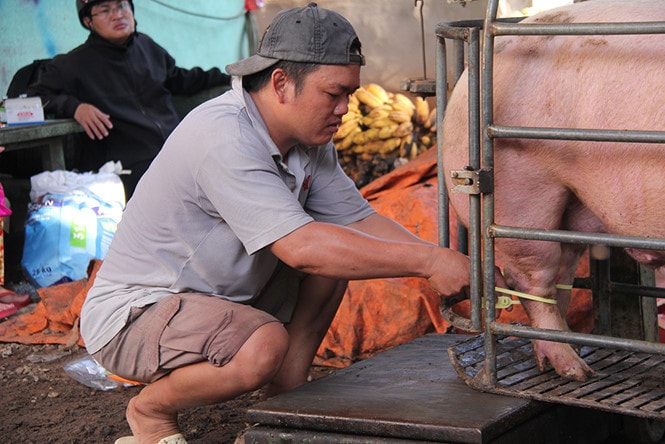Putting a collar on a pig is a coping method.
Putting rings on pigs so that consumers can trace their origins according to the project of Ho Chi Minh City is considered too formal, some components participating in the pork supply chain have a mentality of doing it perfunctorily.
According to the process, pig farmers must wear a bracelet and activate (declare) information about their farm. However, due to difficulties in implementation in the beginning, the Department of Industry and TradeHo Chi Minh City- the project's host unit - allows traders to wear bracelets for livestock breeders.
Mr. Nguyen Ngoc Hoa, Deputy Director of the Department of Industry and Trade of Ho Chi Minh City, said: As of July 31, we no longer allow traders to put rings on pigs. From that time on, we have also deleted and “cut” the code that traders used to declare information for farmers.
 |
| Traders are putting collars on pigs at Mr. Dao Huu Thuan's farm in Thong Nhat district, Dong Nai. |
The figure of 75-77% of pigs with traceability information when leaving the farm is self-declared by the farmers. “We also do not rule out the possibility that farmers give their information to traders to activate. The information of each farm and household is a private brand, and farmers should not hand this over to traders because it can pose potential risks,” Mr. Hoa warned.
Shake hands to deal with
But in reality, traders are still the ones who put the rings on the pigs. On the afternoon of September 10, Mr. Dao Huu Thuan's household (Gia Kiem commune, Thong Nhat district, Dong Nai) sold a herd of more than 50 pigs. A trader brought a bag of yellow strings with codes on them to put on the pigs. When each pig was weighed, the pig catcher put a yellow string on its two hind legs and then put it on a truck to transport to Ho Chi Minh City for consumption.
Trader Do Thi Tam said that she bought these rings in Ho Chi Minh City. Since Ho Chi Minh City launched the pig ring program, she had to persuade pig sellers to register for the program and get the code so that pigs could be imported into Ho Chi Minh City. "I bought these rings for farmers at 3,000 VND/ring, each pig wears 2 rings. This amount is deducted from the pig purchase price," said this trader.
According to regulations, farm owners must put collars on pigs, but most of them ask traders to put them on for them. Then, farm owners get the code issued by the Ho Chi Minh City Department of Industry and Trade to activate it. However, Ms. Tam revealed: “There are farms that have not registered with the Ho Chi Minh City Department of Industry and Trade. If I don’t buy, they will sell it to someone else, and I will lose my business. So when I buy, I put the collar on and find a farm code to activate it, in order to bring pigs into the Ho Chi Minh City market.”
Access "falls" gradually
Most of the pigs consumed in Ho Chi Minh City come from the provinces of Dong Nai, Binh Duong, Long An, etc. According to the process, pigs from the farm after being activated with information are sold to traders and then loaded onto vehicles. This vehicle must be sealed by the veterinary department and traders must activate their information. When transported to the slaughterhouse, the veterinary department at the slaughterhouse will monitor and check the information.
This is to ensure that no negative incidents occur during the process. The same process is applied from the slaughterhouse to the wholesale market. However, from the farm to the slaughterhouse, the rate of traceable pigs decreases from 75% to 65% and from the slaughterhouse to the wholesale market decreases by 30%, to only 35%.
Explaining the above reality, Mr. Hoa pointed out 3 main reasons: First, because the participants are not used to declaring information at each stage. Second, because this is not a mandatory process, the veterinary sector in the provinces is not enthusiastic about participating and still has a "wait and see" mentality. Third, negative factors cannot be ruled out, so they do not implement it.
“This traceability can only be done if Ho Chi Minh City has mandatory regulations as buyers - then the provinces must enthusiastically participate. At the same time, the components in the chain must raise awareness to voluntarily implement it to build their own brands,” said Mr. Hoa.
According to Thanh Nien Newspaper
| RELATED NEWS |
|---|

